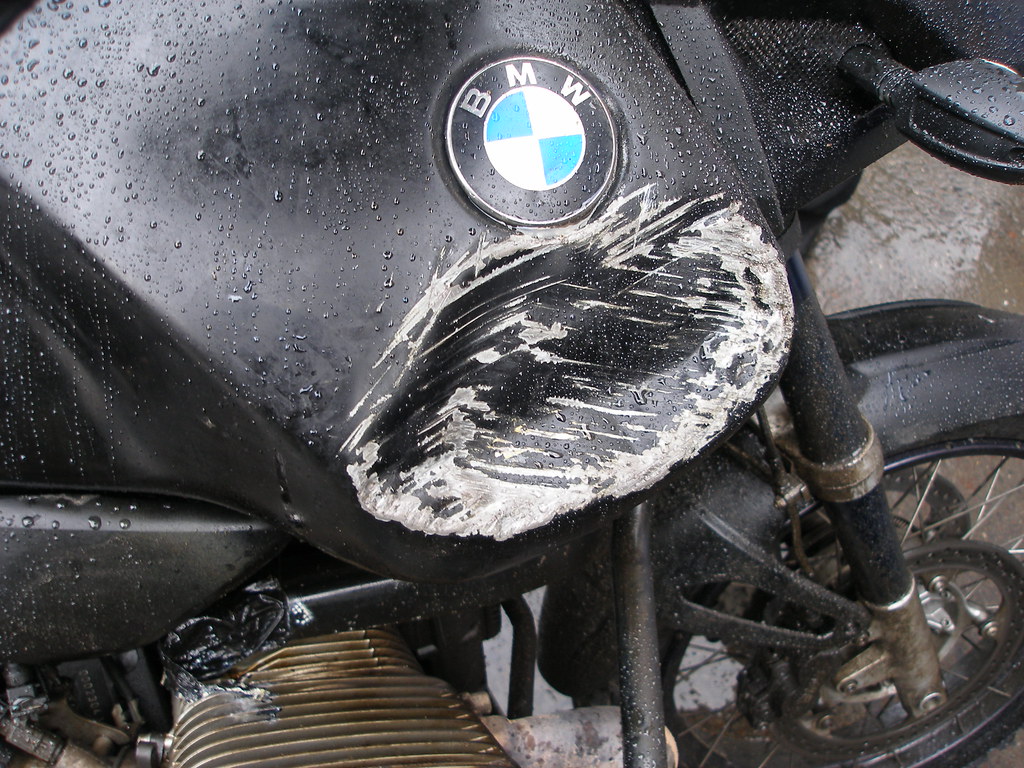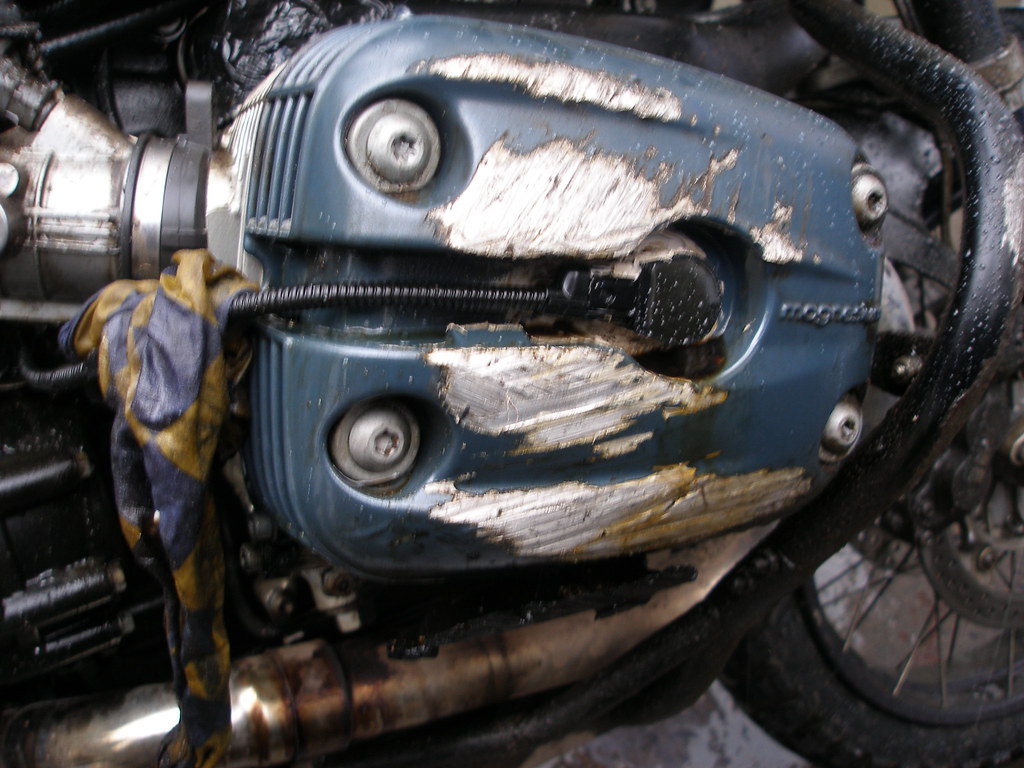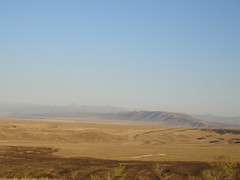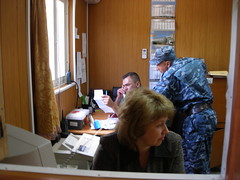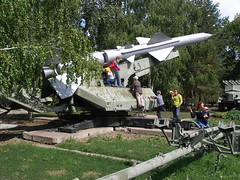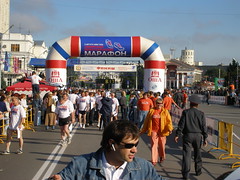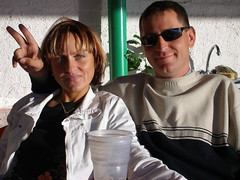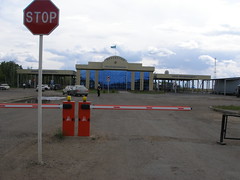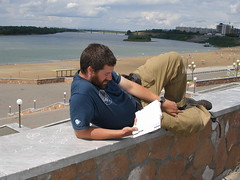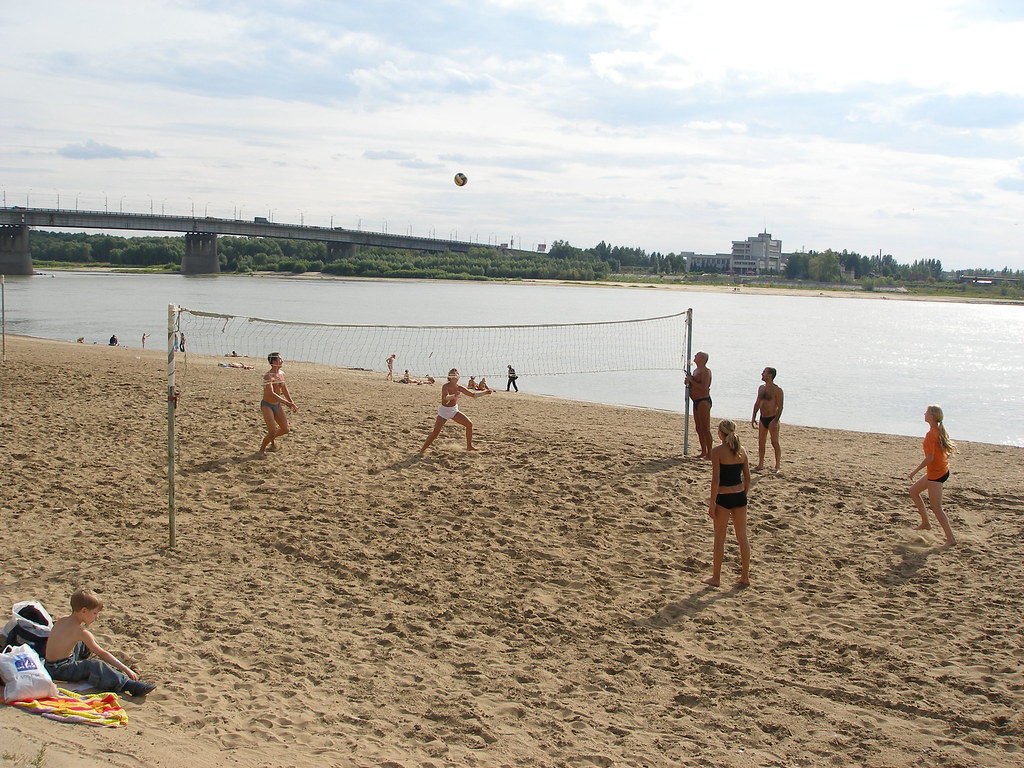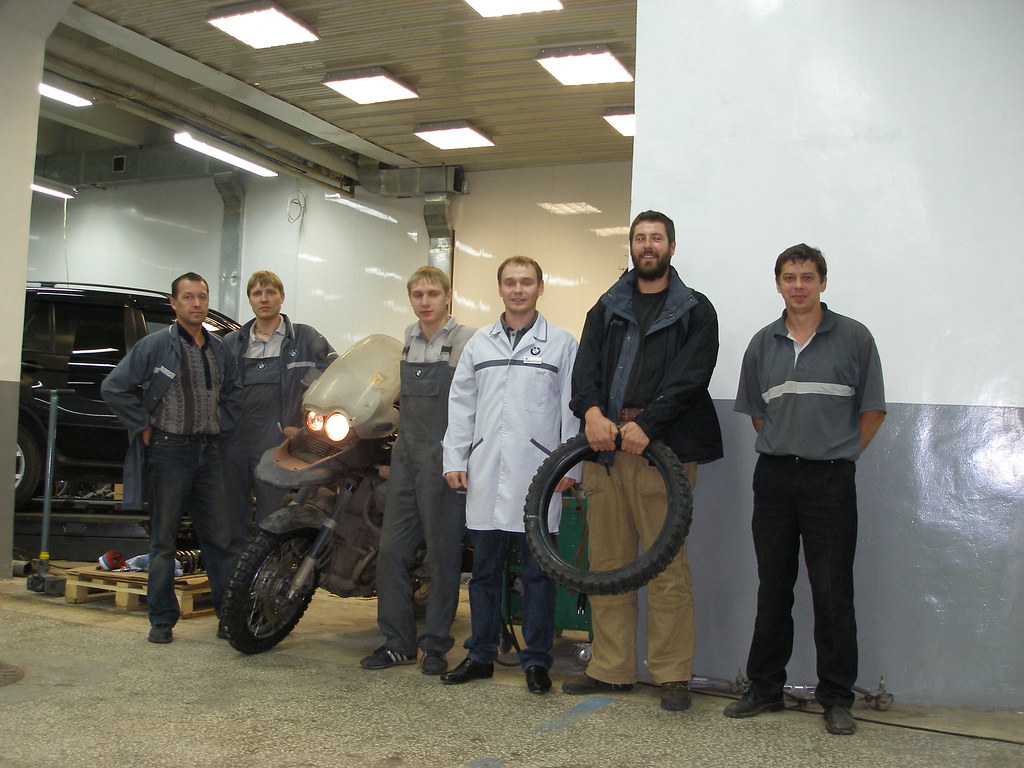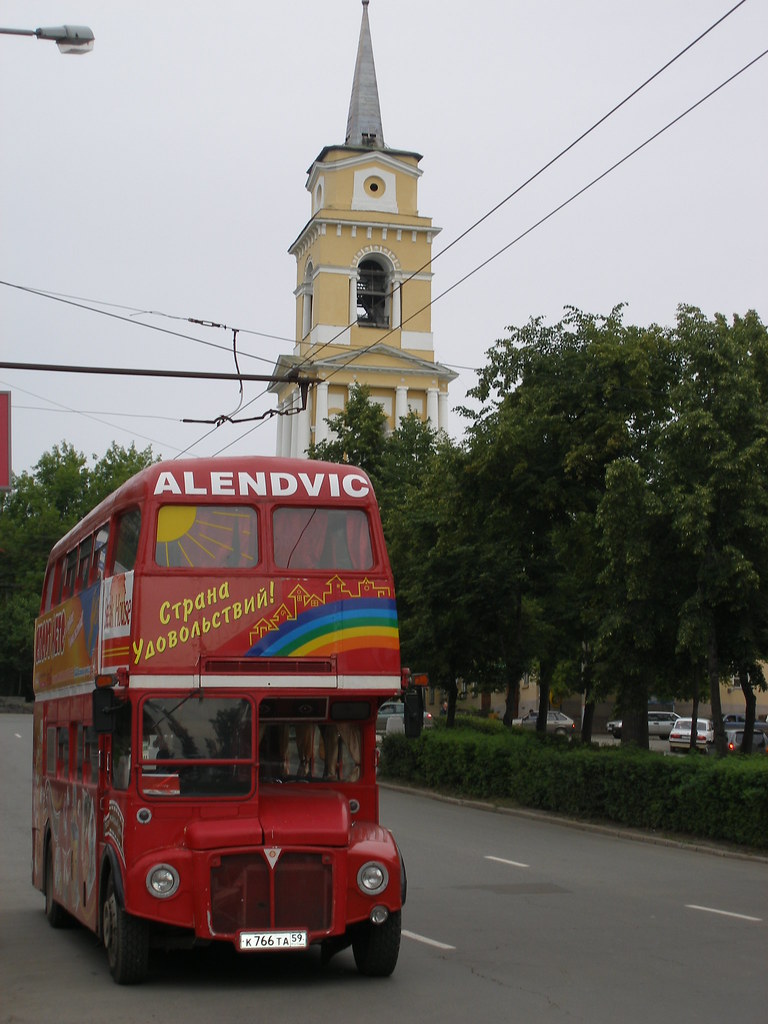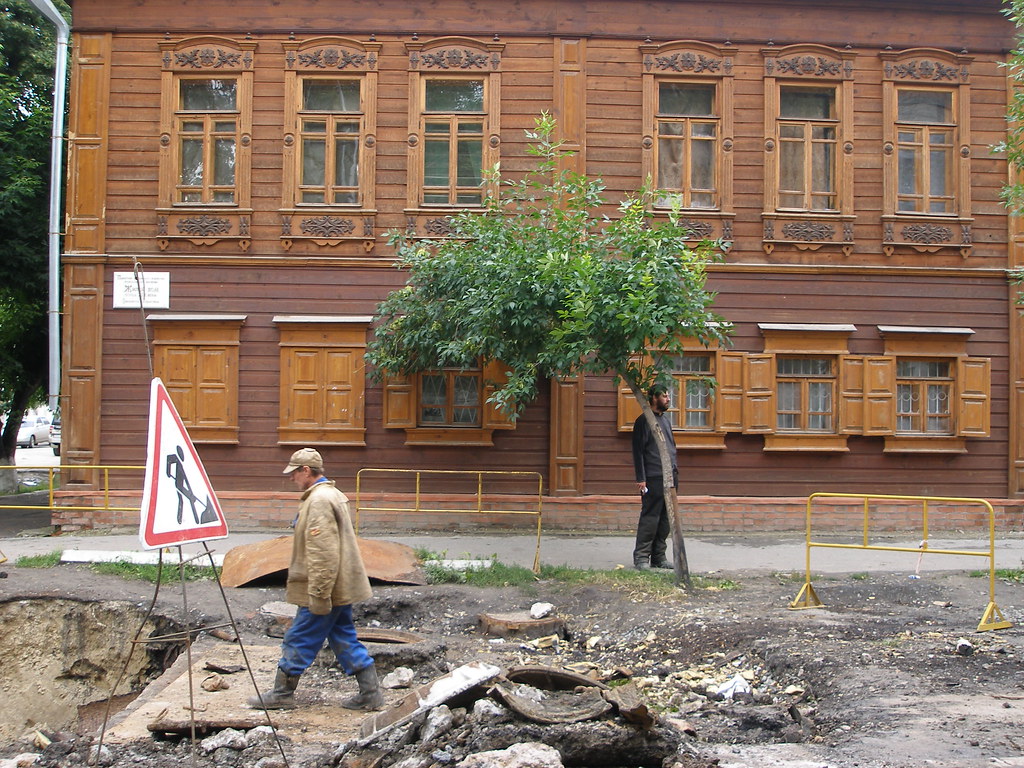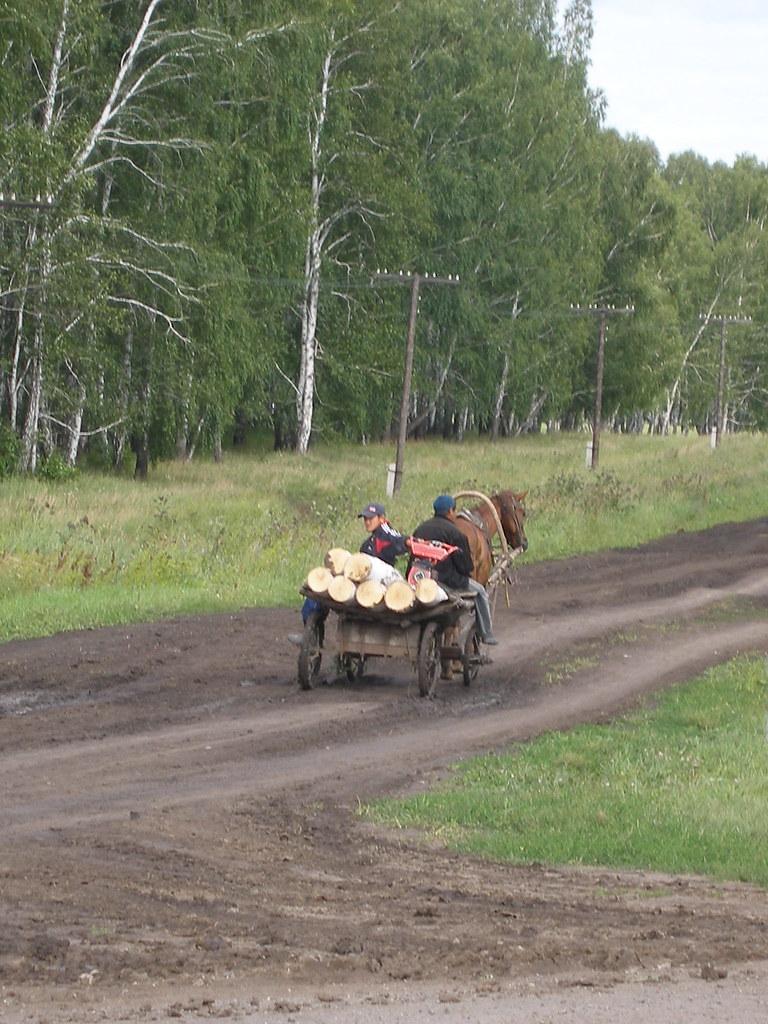Tom had been running low on petrol for a while and we had not seen a garage, which was open, for a good hour or so before lunch. Tom was riding ahead and when he pulled level with a solitary building alongside the road he noticed that hidden behind this was a tiny garage. Although he had already decreased his speed a little before he got near to the building, when he spied the garage itself he slowed down sharply with the intention of pulling in to the left.
Unfortunately, almost a second or two before he had slowed down Peter had glanced over to his right seeing something or other that caught his eye. Since he was riding along at just under sixty mph the speed at which Tom had slowed down meant that the few seconds that that he had taken his eyes off the road were sufficient for him to get so close that when he looked back he saw the back of Tom's bike uncomfortably close to his and had time only to brake and try to swerve out of the way.
If neither of us had had the panniers on the bikes the swerve would have been enough to avoid the collision, but the presence of the panniers meant that each of Peter's right hand pannier and Tom's left hand pannier were ripped off their respective bikes. In addition to this, as Peter swerved, his bike slipped out from under him and careered across the road with him following it sliding along the road on his back. We think the impact happened when Peter was going between forty and fifty mph and Tom was going somewhere in the region of twenty to thirty mph.
Neither of us seemed to be badly hurt, Peter almost immediately having picked himself up was swearing violently about what had happened and storming down the road. As you do, we put shock to one side and both went into crisis mode trying to sort out the situation in the most logical way, dealing with first clearing the road of our possessions and then uprighting Peter's bike which had been lying on its side on the left of the road. When it was lifted up we were greeted by the sight of a badly dented petrol tank and, upon further inspection, a cracked right hand cylinder head cover which spewed oil as soon as the engine was started.
The panniers seemed completely ruined, torn and bent into all shapes and we set to work sorting out possessions from around the crash site. Some were clearly permanently broken (including Tom's computer) and others badly damaged.
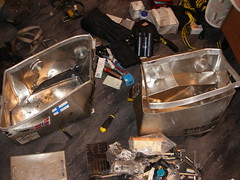
The battered panniers after the crash
Minutes after the collision, miraculously Shinara, who of all things lived in Belfast and spoke fluent English turned up on the scene. We had been extremely surprised to meet her at lunch in the roadside café. She and her family, who were traveling to Semey, helped us to collect our things together and said that they would take them to Semey so that we could pick them up when we made it into town with the bikes. The immediate problem was now how to get Peter's bike into a state so that we could ride to Semey and get some proper attention.
At that point four young guys, Sasha, Max, Sergei and Andrei came from no-where and realising that we had a problem and without speaking a word of English they immediately got to work botching together some sort of repair which allowed Peter's bike to limp to Semey. They refused to take any money for the oil and other materials that they gave us or for the three hours of their time.
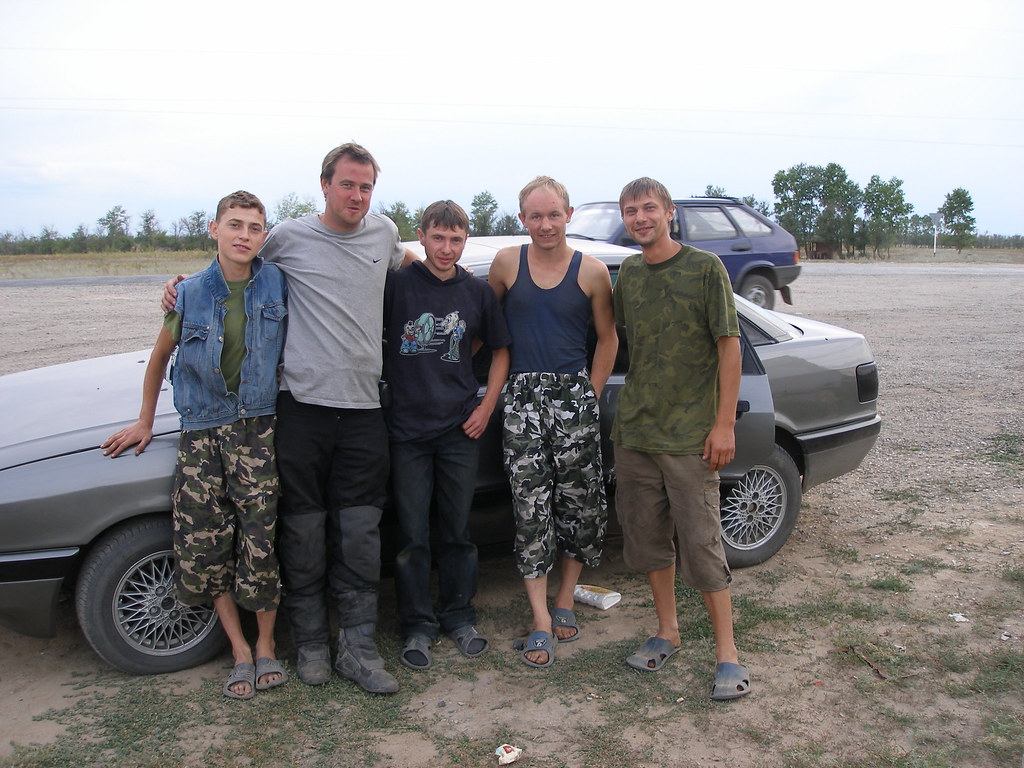 The guys who got us limping to Semey
The guys who got us limping to SemeyWe very gratefully left them and rather irritatingly it was during the ride into Semey that we discovered that the frame for Tom's pannier had been badly bent in the accident and was now banging on his back wheel whenever he went over any sort of bump. Given the problem with the frame and the fact that Peter's bike was over-heating, we road into the night (which in itself is dangerous in Kazakhstan) at about thirty mph, stopping every ten miles to top up Peter's bike with the oil that the four guys had kindly given us earlier.
The next day we went to Shinara's house and after being given lunch by her sister-in-law and being introduced to her brother-in-law (the wonderfully named Aslan-Bek who we will talk a bit more about below) we were taken by Aslan-Bek to a garage suggested by the kids the day before.
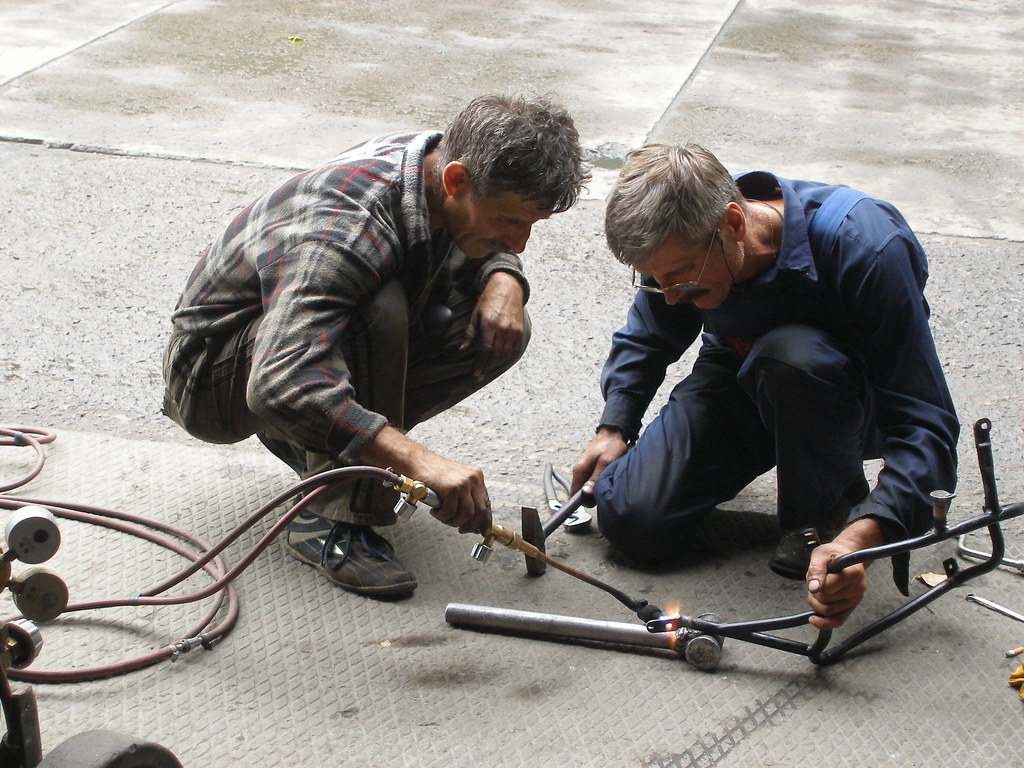 Tom's pannier frame being re-crafted
Tom's pannier frame being re-craftedThe mechanics put aside other work to put five or six people to work on our bikes. Four hours later we left the garage with a pannier frame that had been impressively bashed and welded back into some sort of pannier frame shape and which seemed to be no longer banging on the back wheel and a cylinder head cover that had been cleaned, welded back together with some sort of cold metal weld and then, thrown into the bargain, repainted.
Aslan-Bek then took us, with the smashed up panniers, to some panel beater friends of his. In an afternoon these guys managed to beat and bend the aluminium panniers back into shape (which we thought would be impossible) so that, other than looking a little battered, they almost looked as good as new. Having done this for us they then refused to charge us for any of the work they had done!
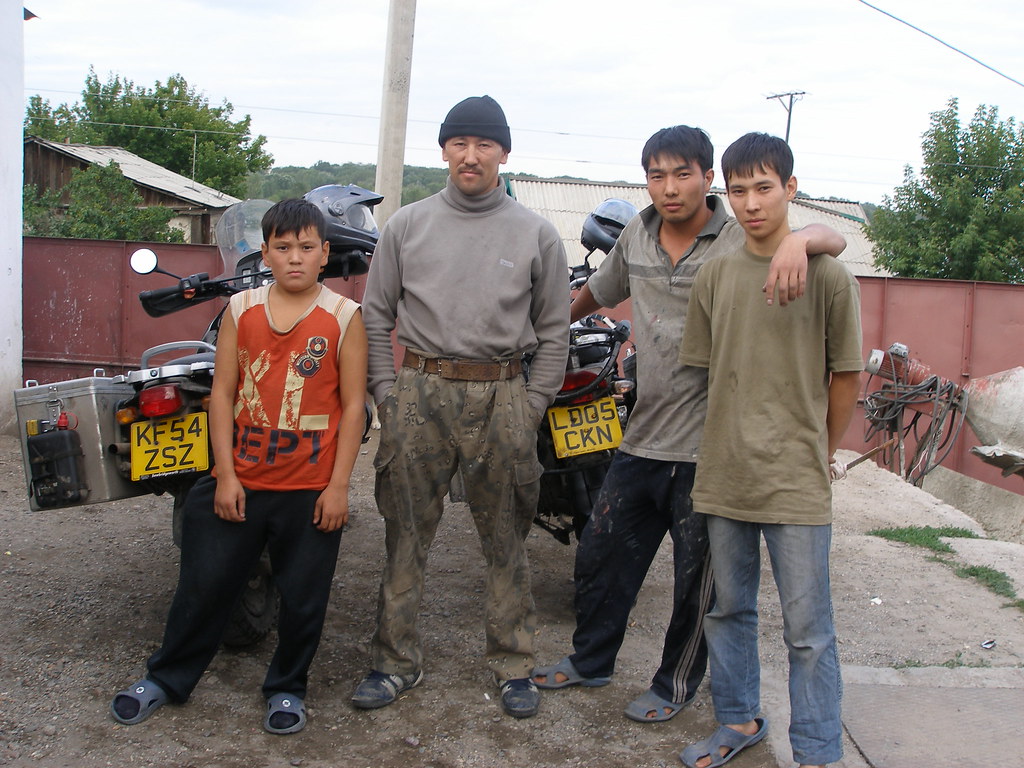 The panel beaters who repaired the panniers
The panel beaters who repaired the panniersWe were both astounded by the speed and the skill exercised by the garage and the panel beaters. This is a sort of can-do attitude that you rarely see in the UK where we are too used to wastefully replacing and not repairing what is damaged. The efforts of these people managed to save us from, potentially a huge set back in our trip, and we cannot thank them enough for what they did.
Another big thanks must go to Shinara, her family and especially Aslan-Bek and his family Aisyly, Raimbek and Annel. Aslan-Bek is a captain in the Semey traffic police and, it is safe to say, enjoys the good life. Married with two children he lives in a lovely house with all the mod cons including his own personal banya (similar to sauna) in his back garden and his life seems to consist of mainly (and in no particular order) eating, drinking, hunting bears and other wildlife in the mountains, going to the banya and spending time with his family.
On our final night in Semey we were invited by Aslan-Bek and his family to dinner at their house and when we turned up flushed with the success we'd had with the bikes and the panniers we were greeted with a huge spread, specially prepared for us, of local foods, salads and somewhat ominously, lurking at one end of the table, a large bottle of vodka. Of the man himself there was no sign and we were told by Shinara that he was still at work and that while we waited for him to come back we should perhaps have a banya to relax ourselves and get us ready for dinner. To this end we were handed bunches of birch twigs (to beat ourselves with), soap, towels and escorted to the banya.
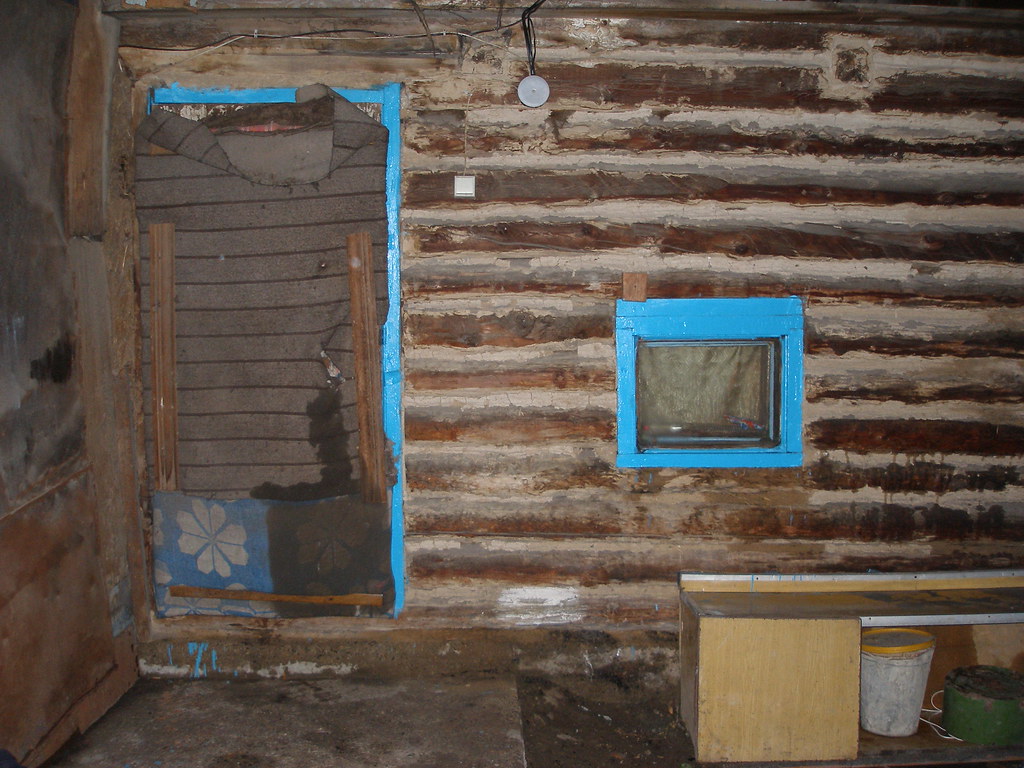
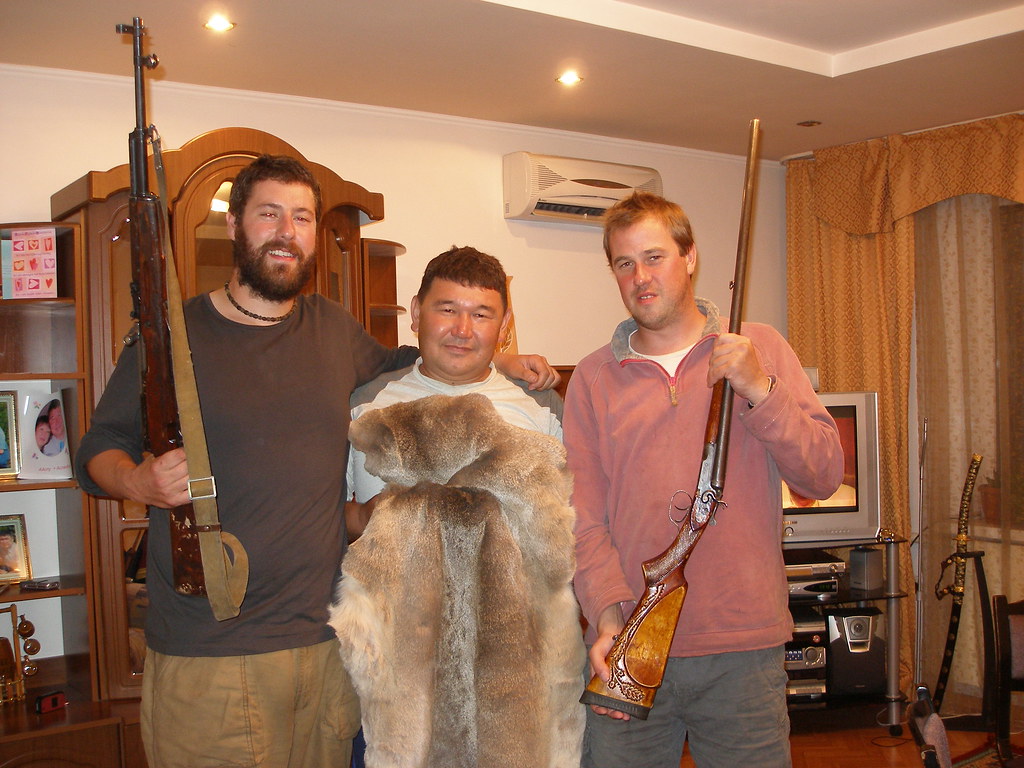
First Aslan-Bek's banya and then as the evening progresses we get to play with his guns
About fourty five minutes later, emerging, slightly battered but refreshed, from the banya we went back into the house and the four hours of eating, drinking and toasting commenced (all of which it is impossible and extremely impolite to refuse). One hour and a bottle of vodka later Aslan-Bek walked through the door unusually merry. It was at that point that it emerged that he had not been at work all this time as we had been told, but had instead been at a public banya with his friends and while there had worked his way through a couple of bottles of vodka with a few bites of bliny. The evening proceeded as before but this time with Aslan-Bek providing entertaining company and as the empty bottles mounted we were allowed to play with his hunting guns and inspect the fur of the bears he had shot up in the Altay Mountains. All of this time Shinara was painstakingly translating between all the parties.
At two in the morning Aslan-Bek felt that it was now time for Peter to try a Kazakh tradition and to drink the blood of a mountain goat. In order to find the aforesaid blood we all piled into his car and somewhat unsteadily drove across town to the house of a more junior policeman that Aslan-Bek worked with. After waking the unfortunate guy and his family up we all sat in his kitchen until nearly four drinking more vodka and eating the food his wife kindly prepared for us while in the middle of the table was a smaller bottle filled with a mysterious red looking liquid.
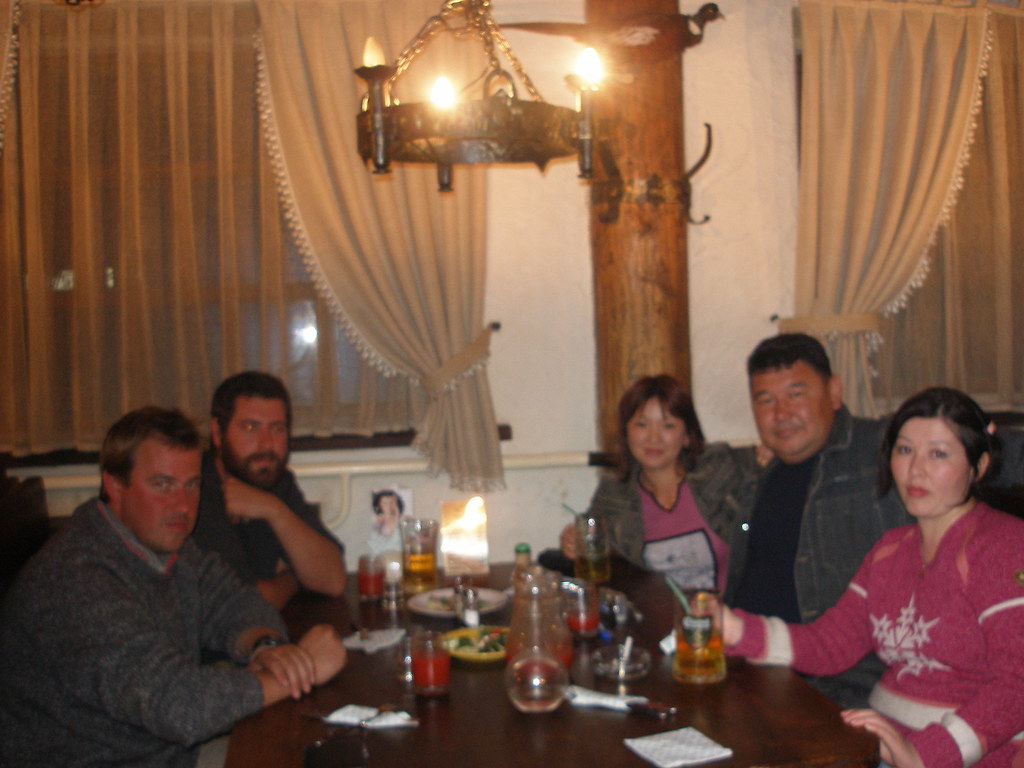
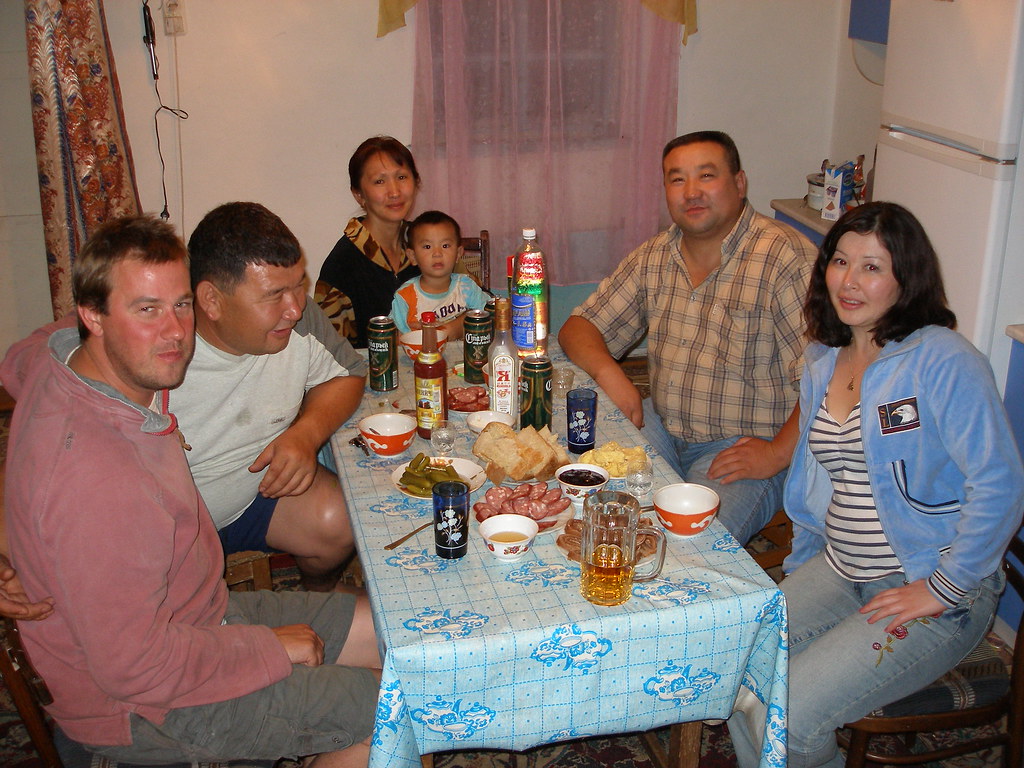
Drinks with Aslan Bek, Shinara and her sister and then late night food, vodka and goat's blood in Semey
Maybe it was the amount that was drunk by Aslan-Bek, but we were released at four and dropped back at the hotel without the bottle of red stuff ever having been opened and so to this day Peter has no idea whether he had a lucky escape from drinking goats blood or whether he was the subject of a practical joke – the blood just being tomato juice mixed, no doubt, with vodka.
